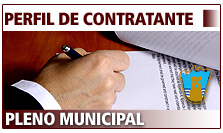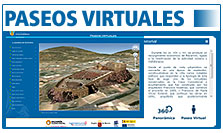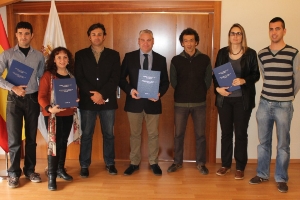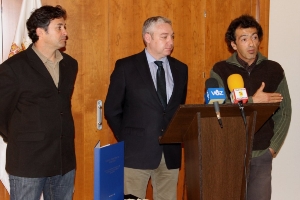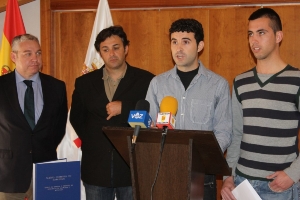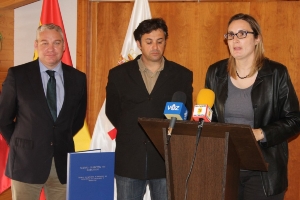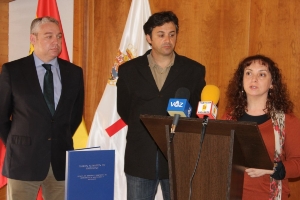A SURVEY ABOUT THE CLIMATE CHANGE ALERTS ABOUT THE EFFECTS THAT IT WILL PRODUCE IN MAZARRÓN TO MEDIUM AND LONG TERM
The survey contains some recommendations that will guide to the Town Hall to face these changes
Yesterday was presented in the Town Hall of Mazarrón a survey about the impacts that the climate change will produce to medium and long term in different economic and social aspects and also in the natural heritage. This presentation was made by the Mayor, Ginés Campillo, the councilor for Environment, David Fernández, the coordinator of the survey, Antonio Soler, and María Dolores Olivo, Consuelo Murcia, Daniel Moreno and Carlos Martínez; who are from Mazarrón and have actively participated in its redaction dealing with different topics such as the hydrology, meadow of Posidonia and the health.
The councilor for Environment has explained that “with this survey we become in the first town of Murcia that studies in a detailed way the impact of the global warming, following the recommendations of United Nations and the international scientific community”. According the councilor “this survey requested by the town hall, will help to undertake an action plan that mitigates the impact as it contains some recommendations that we believe necessary to undertake to combat the climate change”.
In this survey, Antonio Soler spoke of some areas of the study (7 in total) among them was highlighted “the rise of the sea level between 2 and 3 millimeter every year, that also will increase its salinity and temperature”. Soler warned that “in 2050 might be possible to lose between 15 and 20 meters of coast in the beaches, so it would have to work in urban planning with the State Coasts to go back the coast line, so that the sea does not affect infrastructure and buildings”. The coordinator said that would be important to inform to the citizens that “they might lose their houses, so that later there are not complaints”.
In the area of Fishing, “the climate change will produce effects in the sea current. These changes can favour a bigger capture of pelagic species, as has happened in the last years, although it might produce the contrary effect. Less to fish” announced Soler who added that “it should be considered other income ways for the fishing sector, for example the selective fishing and minor fishing”. Also, he highlighted that is priority “to boost the marine reserves such as Cape Tiñoso, safeguarding the meadow of Posidonia and enhance its value through the scuba diving tourism and environmental awareness campaigns”.
In Agriculture, Soler said that “it will rain less and, and when rains, it will be more intensely. The season without rains will be longer and, as the temperature will be higher, there will be less humidity on the land and it will produce aridity of the land”. Hence Soler advised “to adapt the agricultural production to this of hydric stress”, while also he pleaded to undertake an “energy saving plan, not only to municipal level, but also to citizen level, for the increase of the capture and storage of carbon through the management of the land and vegetation”.
On the other hand, the geographers Carlos Martínez and Daniel Moreno have worked in the hydrology issue, studying the irrigation of avenues of torrential rains along the dry riverbed due to the change in the precipitation rate that is producing the climate change. Their research has been focused in the dry riverbeds of Pastrana, Villalba, Moreras, Lorentes and Valdelentisco. After the survey of each basin and verify the rise of the number of gotas frías (cold drops), alert that “it can produce problems of erosion in the bed of the channels and , therefore, instability for infrastructure such as bridges; as well as the increase of flood areas with the crop losses and street flooding by sewer saturation”. For this “we recommend to the Confederación Hidrográfica del Segura to make a study of all the dry riverbed and to the town hall to include new possible flood areas in the next Plan General”.
Consuelo Murcia spoke about the prairie ocean. “It plays an important role in the quality of the coasts and for the life of the sea. In this sense, it is important the awareness of the citizenship creating an environmental volunteer and a monitoring committee”. Finally, María Dolores Olivo, who was in charge of the area of Health, focused in the illnesses that can attract climate change, divided into three different parts. First the illnesses that might be produced by high temperatures such as severe burns. Second, the diseases related with the air pollution that would affect to the skin and the eyes, increase respiratory allergies and increase of cáncer. And the third one, those related with the transmission of vector and rodent than can arrive with with outsiders and remain by the climate change.
The Mayor of Mazarrón, Ginés Campillo, has highlighted that “compared to the alarmist announcements of other studies, in this case this ‘environmental audit’ of the town gives us the prevision with the enough time so that these effects won´t be produce”. The first councilor thanked to the drafters of the study their great work with such a good recommendations” and told them that “some of them have been already started as with the ‘Pacto de los Alcaldes’(agreement of Mayors) or the enhancement of our seabed”.
